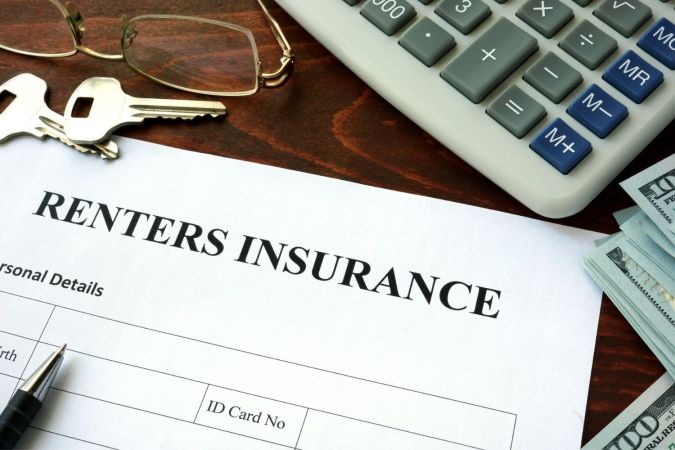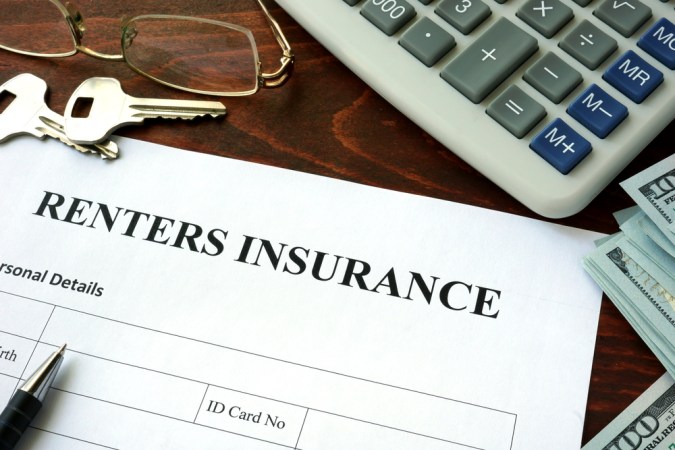We may earn revenue from the products available on this page and participate in affiliate programs. Learn More ›
Q: I am renting my first apartment, and my friends keep telling me that renters insurance is a good idea. I’m looking into policies but need more guidance. How much renters insurance do I need in order to make sure my belongings have adequate coverage if something happens?
A: The answer to the question “How much renters insurance do I need?” is that it can depend primarily on the possessions you have and their value. You generally want to have enough renters insurance to cover replacement of your possessions in case they are damaged or destroyed by a covered event. If you have very few items of value, that could mean getting a policy that will cover the replacement cost of these items. If you have a lot of belongings or several valuable personal possessions, you will likely require additional coverage. In addition to personal property coverage, you’ll also need to make sure you have enough coverage for liability and loss of use, which you can read more about below.
Renters insurance typically provides coverage for renters’ personal property, legal and medical liability, and loss of use.
How does renters insurance work? And what does renters insurance cover? As part of the definition, the best renters insurance companies offer three main types of coverage on most basic policies. First, it offers coverage for personal property loss. That means if a covered event or peril listed in the policy damages the renter’s possessions, the renters insurance policy would provide funds to replace those items lost once the deductible has been paid. For instance, a renters insurance policy would pay to replace the renter’s belongings if they were destroyed in an apartment fire, which is generally a covered peril.
Renters insurance coverage can also pay for legal and medical liability. Personal liability renters insurance can protect renters against paying out of pocket if they (or a family member) are found legally responsible for certain damages. For example, if a family member accidentally damaged a neighbor’s personal property or the family dog bit a passerby, liability coverage would help cover the associated legal and medical fees.
There is also another part of the policy that pays for loss of use, which is sometimes called additional living expenses coverage. For instance, if a fire caused the renter to have to live elsewhere while repairs were being made, loss of use coverage would help pay for living expenses above and beyond normal costs of living, such as hotel costs or meals out.

Landlords may require renters to carry a certain amount of renters insurance coverage.
Is renters insurance required? While carrying a renters insurance policy is a smart choice for most renters, it also may be required; some landlords require renters to carry a base amount of renters insurance coverage. It’s important for renters to check to see how much coverage is required of them as a bare minimum, if such a requirement is in place. It might also be worth checking to make sure the coverage required by a landlord provides adequate protection for the renter.
Landlords often require renters to have renters insurance because it actually provides some layers of protection for them. The main reason is that it can help protect landlords from being hit with lawsuits if the renter’s possessions are damaged. Renters insurance can also help with relocation expenses.

In general, renters should have enough personal property coverage to replace their belongings if they are damaged, lost, or stolen.
Renters often wonder, “How much coverage do I need?” To find out how much renters insurance is appropriate, it’s important for renters to determine the total value of all their personal possessions. Many people underestimate how much their possessions are worth and are surprised to find their renters insurance coverage isn’t high enough. To determine the total value of personal property, many insurance companies recommend completing a home inventory, which is a list of everything a renter owns with the estimated value of each item. To back up these claims, many renters also take pictures of rooms to show what is in each room or even save receipts when an item is purchased for the home. In addition to helping the renter determine how much coverage they should carry, having such a list can make it far easier to file a claim. Renters might also be able to search “how much renters insurance do I need calculator” to find estimates of coverage costs based on what they own.
It’s important to note that renters insurance typically reimburses policyholders for lost or damaged possessions by either paying the actual cash value or replacement cost for items. Actual cash value is the depreciated value of the item, or the amount the item is worth at the time of the loss, which is almost always less than the initial cost of the item. Replacement cost reimburses the policyholder for the amount it would cost to replace the item with one of similar value in the present day. As such, renters might want to look into replacement cost policies so that they’re not left covering a portion of the cost to replace items.
Renters who own valuable items like jewelry or antiques may need to add endorsements or riders to their policy for the items to be covered.
When asking the question, “How much renters insurance coverage do I need?” it’s important to keep in mind that basic renters insurance policies tend to be built around standard items that a renter possesses. The amount of coverage offered does not account for very expensive items like jewelry or antiques. According to the Insurance Information Institute, most basic policies tend not to cover more than a certain amount for expensive items like jewelry, which is generally capped at $1,500. This is called a sub-limit.
Luckily, renters can choose to add endorsements or riders to help cover their valuable items. For instance, renters might be able to purchase an endorsement to cover an expensive piece of jewelry, a certain family heirloom, or even big-ticket items like recreational sporting items.
A renters insurance policy should have enough liability coverage to cover expenses incurred after a major incident.
Renters can also increase or decrease their liability coverage limits, depending on their needs. A renters insurance policy should have enough liability coverage to cover expenses after a major incident. Many standard policies include $100,000 in liability coverage, which is often adequate for many renters.
However, if a large lawsuit is filed against the renter, these costs can add up quickly. For example, if a guest suffered a major injury that was determined to be the fault of the renter, the renter may be responsible for large medical bills or a lump-sum payment for damages, which may rise above the $100,000 mark quickly. Increasing liability coverage usually does not increase premiums by a drastic amount. With that being the case, it can be worth it for renters to look into increasing liability coverage amounts in a way that does not impact their budget beyond a point of reasonable comfort. It can also be relatively easy to work with an insurance agent on the policy to see the effect of added liability coverage on the premium payments.

Loss of use coverage is typically based on a percentage of the personal property coverage limit.
It’s especially important to know how much rental insurance coverage is needed for personal property because it can also affect the loss of use coverage. Loss of use coverage may be calculated using a flat fee or as a percentage of the personal property coverage limit, depending on the insurer. Renters should make sure they check with their insurer to determine how their loss of use coverage is determined.
Flat fees can vary from policy to policy, but it’s more common for insurers to offer loss of use coverage as a percentage of the personal property limit. For a renter who has $100,000 in personal property coverage, a 30 percent loss of use coverage means it would cap at $30,000. Loss of use coverage is used to pay for living expenses above the normal amount if the renter is forced to move out of their apartment while repairs are made after a covered event. For example, a renter whose apartment sustains severe damage from a fire will need to relocate until the apartment has been returned to a habitable condition. The renter may need to move into a short-term rental or long-term hotel, which may cost more than their typical rent payment. Additionally, the renter may be faced with additional costs such as restaurant meals if they don’t have access to a kitchen, parking fees if they need to drive instead of walk to work, and laundry fees if their temporary residence doesn’t have a washer and dryer but their apartment does.

Renters insurance is generally inexpensive to purchase and provides a lot of benefits to renters in case of emergency.
Is renters insurance worth it? One of the perks of renters insurance is that it doesn’t cost much compared to other insurance products. The cost can vary by the geographic location, size of the rental unit, and the coverage limits, but in general renters insurance policies cost between $101 and $262 per year.
For renters on a tight budget, there may be some ways to save on their renters insurance premium. Renters can talk to their insurance agent about bundling insurance products, such as auto insurance, to save money. They can also ask about a higher deductible, which will generally lower premiums. However, a higher deductible means the renter will need to pay more out of pocket before the insurance kicks in to cover a loss, so it’s important for the renter to have at least that amount in a savings account so it’s available as needed.
For a price that can be as low as several morning coffees per month, renters can get the peace of mind of being covered in the event of incidents like fire, windstorms, or theft; protected against lawsuits; and even having some living expenses paid for in case the renter has to live elsewhere for a while.
















